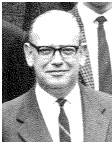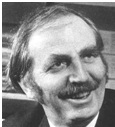|
 |
|
 |
Allan Flanders (1910-73)
British employee relations lecturer at Oxford University (pictured right) where, along with Alan Fox, Hugh Clegg (pictured right below) and others became part of the ‘Oxford School’ of industrial relations. Their ideas greatly influenced The British Royal Commission on Industrial Relations in 1968 (known as the Donovan Report). Flanders was also very influential in the British Labour Party.
Key book
Management and Unions (1970) – a collection of his essays A trade union has two functions:
But its members must come first and its social purpose must derive from their interests.
A union achieves its aims through:
a) industrial methods
b) political action
Even in companies with employee elected directors and managers, conflict is always present between management and employees, because their aims differ e.g. higher wages leading to lower profits. This conflict is best resolved by free collective bargaining i.e. management and unions negotiating (or jointly agreeing) union members’ terms and conditions of employment (e.g. wages and working conditions) without any legal interference from government. Collective bargaining is a “a rule-making process” that creates two types of rules affecting people's employment:
a) substantive rules (pay and other terms of employment like working conditions)
b) procedural rules (bargaining procedures between unions and management)
These rules aim to improve people's:
Management should accept unions as an effective way of involving employees (not political trouble makers), because this will lead to their co-operation and better decisions. In other words, managers should exercise power by sharing it.
Collective bargaining gives employees:
1. Rights (for example, to participate in decision making).
2. Responsibilities (to ensure a company’s profitability) Such responsibilities are evident in productivity bargaining, where unions negotiate higher wages and employment guarantees in exchange for:
Two systems of industrial relations conflict:
1. Formal system (with formal union backing and based upon industry-wide collective bargaining).
2. Informal system This is based in the workplace with shop stewards playing a key role. The importance of this system led in 1960’s Britain to many unofficial strikes without official union backing.
There are two solutions to this conflict:
1. Formalization of workplace and organization-wide bargaining i.e. writing down workplace bargaining procedures and agreements to reduce uncertainty and ambiguity.
2. Union recognition of shop stewards Accepting and encouraging shop stewards (union representatives at the workplace).
Management has social responsibilities towards
a) society and people outside the organization like customers. (external responsibilities)
b) employees (internal responsibilities)
These responsibilities are affected by management power which is controlled by:
Key quotes on unions Collective bargaining... is a rule-making process and involves a power relationship between organizations.
Key quotes on management Management learns to manage by being forced to accept the full responsibilities of management. To act responsibly, however, means to take into account the consequences of one’s actions for others as well as for oneself.
Key quote on human resource management Human resources are people and they do not cease to be persons, whose dignity claims our respect, when they are selling their labour to earn a living.
|
|
|
||
|
|
|
||
|
||
| Copyright © wisdomtowin.com All Rights Reserved | ||
|



